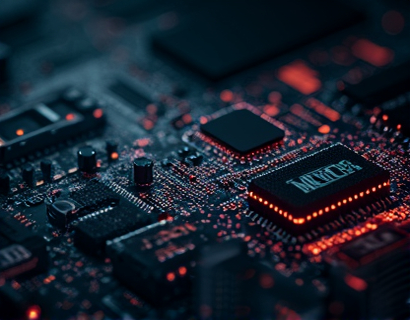Transforming App Marketing with Crypto and AI: A New Era for Digital Innovators
The intersection of blockchain technology and artificial intelligence is ushering in a revolutionary era for app marketing. This fusion is not just an evolution but a paradigm shift, offering unprecedented opportunities for tech leaders and professionals to redefine digital engagement and innovation. As we delve into this transformative space, it's essential to understand how these technologies are reshaping the landscape of app promotion and user experience.
Understanding the Basics: Crypto and AI in App Marketing
To grasp the full potential of crypto and AI in app marketing, it's crucial to first understand the fundamental concepts of each technology. Cryptocurrency, built on blockchain, is a decentralized digital currency that ensures secure, transparent, and tamper-proof transactions. Beyond currency, blockchain's inherent properties such as immutability and transparency can be leveraged to create trust and authenticity in app marketing.
Artificial Intelligence, on the other hand, refers to the simulation of human intelligence processes by machines, particularly computer systems. These processes include learning, reasoning, and self-correction. In the context of app marketing, AI can analyze vast amounts of data to predict user behavior, optimize marketing strategies, and personalize user experiences.
Enhanced Data Security and Trust
One of the most significant advantages of using blockchain in app marketing is the enhanced data security it provides. Blockchain's decentralized nature means that data is not stored in a single location, making it extremely difficult for hackers to manipulate or steal. This is particularly important in app marketing, where user data is a valuable asset. By utilizing blockchain, app marketers can ensure that user data is secure and transactions are transparent, building trust with their audience.
Moreover, smart contracts on the blockchain can automate and enforce marketing agreements, reducing the need for intermediaries and minimizing the risk of fraud. This not only streamlines marketing processes but also ensures that all parties involved adhere to the agreed terms, fostering a more reliable and efficient marketing ecosystem.
AI-Driven Personalization and Engagement
AI's ability to analyze and interpret complex data sets makes it an invaluable tool for personalizing user experiences in app marketing. By leveraging machine learning algorithms, marketers can gain deep insights into user preferences, behaviors, and patterns. This data can be used to create highly targeted and personalized marketing campaigns that resonate more effectively with users.
For instance, AI can analyze user interactions within an app to predict which features or content are most likely to engage a particular user. This allows marketers to deliver tailored recommendations, offers, and notifications, significantly increasing the likelihood of user engagement and retention. Personalization not only enhances the user experience but also drives higher conversion rates and customer loyalty.
Optimizing Marketing Strategies with Predictive Analytics
Predictive analytics, powered by AI, enables marketers to forecast future trends and user behaviors with remarkable accuracy. By analyzing historical data and identifying patterns, AI can predict which marketing strategies are most likely to succeed. This foresight allows marketers to allocate resources more effectively, focusing on high-impact campaigns and avoiding costly failures.
For example, AI can predict the optimal timing for sending push notifications based on user activity and preferences. It can also identify the most effective channels for reaching specific user segments, ensuring that marketing efforts are both efficient and impactful. This level of precision in marketing strategy optimization is a game-changer for app marketers looking to stay ahead in a competitive landscape.
Automated Marketing Processes and Efficiency
Automation is another area where the combination of blockchain and AI can significantly enhance app marketing efforts. Blockchain's smart contracts can automate routine marketing tasks such as ad delivery, payment processing, and performance tracking. This automation reduces manual errors, speeds up processes, and frees up marketers to focus on more strategic initiatives.
AI, meanwhile, can optimize these automated processes by continuously learning and improving. For instance, AI can dynamically adjust ad placements and bidding strategies in real-time based on performance metrics, ensuring that advertising budgets are used most effectively. This synergy between blockchain and AI creates a highly efficient and adaptive marketing machine.
Building Authentic Communities and Brand Loyalty
The use of blockchain in app marketing extends beyond data security and automation. It also facilitates the creation of authentic communities and fosters brand loyalty. By rewarding users with cryptocurrency tokens for participating in marketing activities such as referrals, reviews, and engagement, app marketers can incentivize genuine interactions and build a loyal user base.
These tokens can serve as a form of digital currency within the app ecosystem, allowing users to redeem rewards, access exclusive content, or even vote on future developments. This not only enhances user engagement but also creates a sense of ownership and community, strengthening the bond between users and the app.
Challenges and Considerations
While the potential benefits of integrating blockchain and AI in app marketing are substantial, there are also challenges and considerations to keep in mind. One of the primary challenges is the technical complexity involved in implementing these technologies. App marketers need to invest in skilled personnel or partner with technology providers who can navigate the intricacies of blockchain and AI.
Another consideration is the regulatory landscape. As cryptocurrency and blockchain technologies are still evolving, regulatory frameworks are often uncertain or in flux. Marketers must stay informed about legal requirements and ensure compliance to avoid potential issues. Additionally, the environmental impact of blockchain, particularly proof-of-work systems, is a growing concern that needs to be addressed.
Future Trends and Innovations
Looking ahead, the integration of blockchain and AI in app marketing is poised to become even more sophisticated. One emerging trend is the use of decentralized finance (DeFi) principles to create more inclusive and accessible marketing ecosystems. DeFi platforms can offer new ways for users to participate in marketing activities and earn rewards, democratizing the marketing process.
Another exciting development is the incorporation of augmented reality (AR) and virtual reality (VR) enhanced by AI, creating immersive marketing experiences. These technologies, when combined with blockchain for secure and transparent transactions, can revolutionize how brands interact with their audiences.
Furthermore, the rise of decentralized autonomous organizations (DAOs) in the marketing space could lead to more collaborative and community-driven marketing strategies. DAOs can enable marketers to pool resources, share insights, and coordinate efforts on a global scale, fostering innovation and creativity.
Conclusion
The fusion of blockchain and AI is transforming app marketing in profound ways, offering unprecedented opportunities for security, personalization, efficiency, and community building. As tech leaders and professionals, embracing these technologies is not just an option but a necessity to stay competitive and innovative in the digital age. By leveraging the power of crypto and AI, marketers can unlock new levels of digital engagement and drive meaningful growth for their apps and services.










































